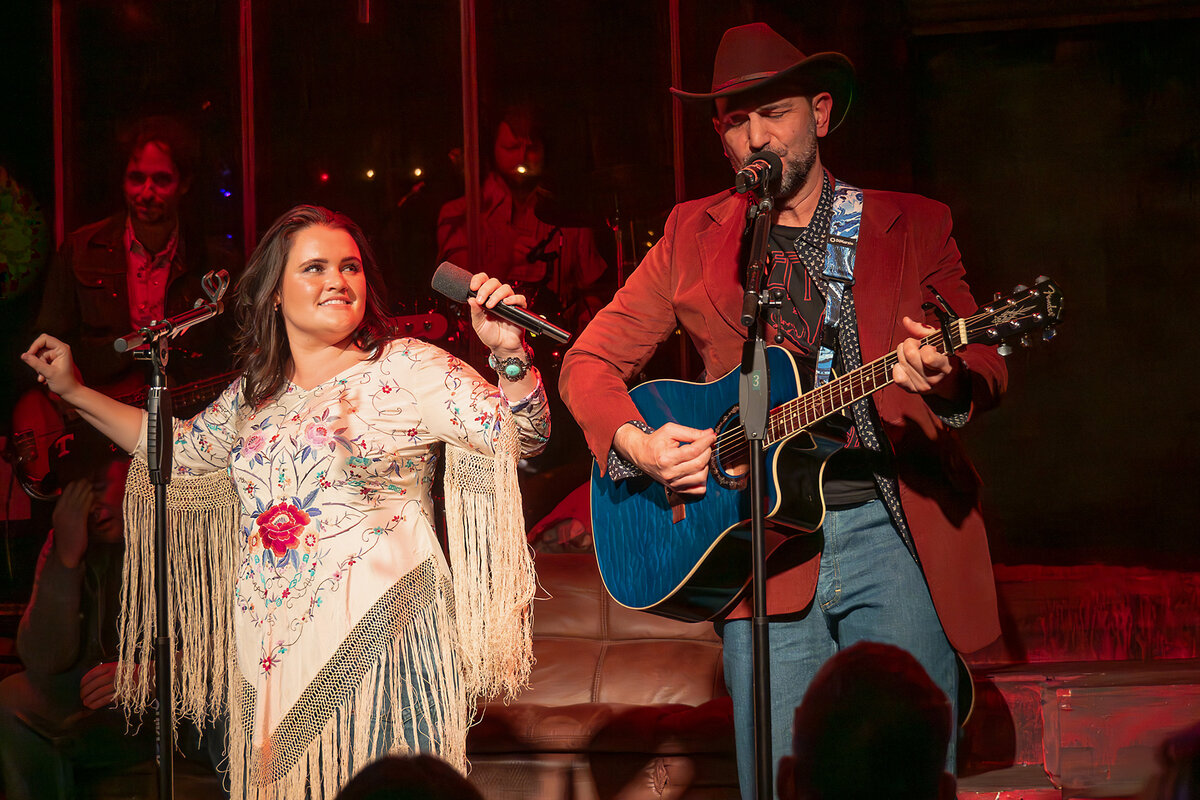Want to hear the latest country music? Try Broadway.
Loading...
| New York
The Upper West Side of New York City isn’t exactly a bastion of country music. Yet a Little Nashville has sprung up here. On West 86th Avenue, where every apartment building has a uniformed doorman, an off-Broadway theater has mounted a new musical with a twangy score. “Music City” is about an aspiring country star, T.J., who falls in love with a songwriter who’s just moved to Nashville, Tennessee. The show kicks off with T.J. and his brother singing a song called “Y’allsome.”
“Y’all some freakin’ good lookin’ country music lovers,” the actors sing to the audience. In truth, the theatergoers don’t look like regulars at a honky-tonk hootenanny. But the setting is convincing. The entire West End Theatre has been transformed to resemble a rustic Nashville bar that hosts open mic nights. Its walls are papered with Kenny Rogers album covers, posters of Johnny Cash, and flyers for Lainey Wilson. The audience, seated at circular bar tables, claps along to the tunes. There’s even an occasional whoop.
“It’s fun that country music is having its moment,” says audience member Jasmine Jourdain. “It didn’t many, many years ago when I was a kid. And it’s fun to see it kind of revitalize here in New York City.”
Why We Wrote This
A story focused on“Music City,” which opened off-Broadway this month, is the latest show to embrace the country genre. Can Nashville music make it in New York?
For the most part, show tunes on Broadway still sound more influenced by Andrew Lloyd Webber than by, say, Morgan Wallen. But country music is making inroads. The comedic “Shucked,” set in a Midwestern corn-farming town, features songs by Shane McAnally and country star Brandy Clark. Its accolades include a Tony Award for best featured actor as well as a Drama Desk Award for outstanding music. An adaptation of S.E. Hinton’s novel “The Outsiders,” set in Tulsa, Oklahoma, incorporates country into its songs. It won this year’s Tony for best musical. Elton John’s score for the newly opened “Tammy Faye: The Musical” boasts a country twang.
These musicals aren’t just responding to country music’s growing cultural reach. They’re also telling stories from beyond Manhattan. The productions are broadening the outlook of musical theater to reflect different aspects of America.
“Post 2016, there was a shock wave for liberal America,” says Joanna Dee Das, an associate professor in the performing arts department at Washington University in St. Louis. “There was a huge increase in awareness and thinking about giant segments of the American population that places like New York hadn’t really considered, or thought about, or taken seriously. And there was a sense that people who identified in theater circles in New York, or liberals in general, needed to really understand [those places].”
It’s not as if there haven’t been past attempts at country musicals. “Urban Cowboy,” a 2003 adaptation of the John Travolta movie, flopped. So did “Hands on a Hardbody,” a 2013 musical about a competition to win a pickup truck in a Texas town. In 1982, “Pump Boys and Dinettes” fared better. The show about Southern gas station attendants and diner waitresses ran for a year, and then refueled to go out on tour. New York Times critic Frank Rich panned it.
“The apparently all-white South they celebrate is so relentlessly congenial it makes Rodgers and Hammerstein’s romanticized Oklahoma seem like Las Vegas by comparison,” he wrote.
“What does Middle America really mean?”
Today’s Broadway shows are built differently. When “Oklahoma!” returned in 2019, it wasn’t so much a revival as it was a deconstruction of the original. The musical centered on a mixed-race relationship and amplified sexual tensions and violence. It also swapped out playing the original lush orchestration in favor of reinterpreting standards such as “Oh, What a Beautiful Mornin’” with pedal steel guitar, banjo, and fiddles. “The Outsiders,” too, boasts an Americana flavor with country tunes such as the rollicking “Friday at the Drive-in” and the plaintive “Far Away From Tulsa.” Though it’s set in the 1960s, Ms. Das says it cautiously examines white, working-class Southern identity politics. At least Broadway is starting to ask pertinent questions, she says.
“What does Middle America really mean? What does the heartland mean? Who’s included in that?” says the professor, whose upcoming book, “Faith, Family, and Flag: Branson Entertainment and the Idea of America,” is about Missouri’s popular vacation spot. “All of these spaces in the United States in the 21st century are racially diverse, ethnically diverse.”
Musical Writers, a Dallas-based online academy designed to nurture budding talents, points out that great shows can originate anywhere in the U.S.
“All the cool kids are writing about 20-somethings in New York,” says Amanda Dills, an Oklahoma City-based content writer for
MusicalWriters.com. “I grew up on a farm in the middle of Nebraska. My dad was a farmer. My mom was a teacher. I think the part of growing up and when you accept where you’re from and learn to embrace it is realizing that their stories are worth telling in those places, too.”
Ms. Dills’ musicals include “The Singing Shepherd” and “Fat Girlfriend,” winner of the 2009 Omaha Theater Arts Guild Award for best new script. They show that “You can write stories about the middle of the country without it having to be country,” she says.
Welcoming country in the Big Apple
Besides, country music doesn’t usually equate with commercial success in the theater. But “Shucked,” which was developed in Salt Lake City, broke through in 2022. It’s about a con man who swindles a town of corn farmers. (Picture an agricultural “Music Man.”) The multiracial cast included a nonbinary actor playing a nonbinary character. The occasionally ribald comedy leans into, ahem, corny jokes. Publicity materials for “Shucked,” which has moved from Broadway to a recently launched nationwide tour, tout Reba McEntire as the show’s official “stalks-person.”
These days, Broadway isn’t so much a finish line for musicals as it is an important pit stop along a cross-country route, says Elizabeth Wollman, author of “The Theater Will Rock: A History of the Rock Musical, from ‘Hair’ to ‘Hedwig.’”
“[‘Shucked’] poked a lot of holes in what a country music audience is and what would run well on Broadway,” says Ms. Wollman. “It matters a lot that the creators are openly queer and are established in Nashville.”
The team behind “Music City” is hoping that “Shucked” signals that New York audiences are open to country sounds. Its songs are by Nashville songwriter J.T. Harding, including a 2014 hit he co-wrote with Keith Urban that the country star recently performed on NBC’s “Today” show.
“Someone texted me and said, ‘I just walked by Rockefeller Center. ... Keith Urban is standing on a taxi cab. The roof of it is dented. His band is playing “Somewhere In My Car” and people are going crazy,’” says the songwriter, whose hits for Blake Shelton and Kenny Chesney also appear in the show. Mr. Harding took it as a sign that the city is embracing Nashville sounds. The book for “Music City,” written by Peter Zinn, is a gritty love story about two struggling songwriters living on the poverty line.
“The boy and girl are forming this relationship,” explains award-winning director Eric Tucker. “But he’s delivering drugs to her mother. She’s trying to keep her mother off of the drugs.”
It’s a very American story, says Mr. Tucker. He believes the musical’s authenticity and relatability – not to mention its rousing ending – will draw audiences during its run through Dec. 22. One of its investors is a Broadway producer who believes it has the potential to be developed further.
Ms. Jourdain, who tries to see a show every week, singles out the “beautifully written” production’s warm humor as a highlight. Unexpectedly, she loved the music, too. “People are realizing that good music and good lyrics transcend cultures and backgrounds,” she says. “And what a better city than New York City for it to be introduced to?”








